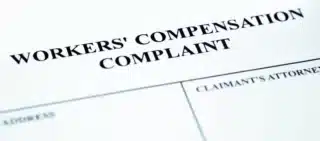
At Strong Law Offices, we have a team of workers' compensation lawyers who understand the financial setbacks and physical limitations...


Is workers’ comp taxable in Illinois? As an injured employee in Bloomington, understanding the tax implications of workers’ compensation is crucial for proper financial planning. Workers’ compensation benefits in Illinois are generally non-taxable at the federal and state levels. This ensures that injured workers receive the financial support they need without additional tax burdens. However, exceptions to this general rule exist, such as the Social Security Disability Offset and certain retirement scenarios. It is crucial to accurately report workers’ comp benefits on your tax return and seek professional tax advice to avoid unexpected tax consequences.

In general, workers' compensation benefits in Illinois are considered non-taxable at both the federal and state levels. The Internal Revenue Service (IRS) does not classify workers' comp benefits as taxable income to ensure that injured workers have the opportunity to receive the full extent of the financial support they need after a workplace accident. This non-taxable status applies to wage replacement benefits as well as medical benefits received through the workers' compensation program.
While workers' comp benefits are typically non-taxable, there are exceptions that may apply. Situations where certain portions of workers' compensation benefits may become taxable include:
If an individual receives Social Security Disability Insurance (SSDI) benefits and workers' compensation simultaneously, a portion of their workers' comp benefits may be subject to taxation. This is known as the "Social Security Disability Offset" rule. The taxable amount is determined based on a formula that considers the total disability benefits received.
If you received a lump sum workers’ compensation settlement, the amount will be prorated to reflect the monthly amount that would have been received. Payments for work-related medical expenses and legal fees are not included under the offset rule.
In some cases, workers' compensation benefits received after reaching the retirement age may be subject to taxation. This can occur when workers' comp benefits are considered "replacement income" rather than compensation for a specific work-related injury.
In certain cases, workers' compensation benefits may include amounts that serve multiple purposes, such as covering medical expenses and lost wages. If the portion allocated to lost wages is taxable, it must be reported as such.
Even if workers' compensation benefits are considered taxable in certain situations, they are still excluded from federal income tax. Instead, they are subject to a federal tax offset. The benefits are not taxed, but they may impact the amount of other benefits that are taxable.
Workers' compensation insurance provides various types of benefits to employees who suffer work-related injuries or illnesses. The benefits that are available can vary depending on the nature of the injury. The most common types of benefits provided by workers' compensation insurance in Bloomington, Illinois include:
Workers' comp insurance covers reasonable and necessary medical expenses related to work-related injuries or illnesses. This includes doctor's visits, hospital stays, surgeries, medications, diagnostic tests, physical therapy, and rehabilitation. The insurance typically pays for these expenses directly to the healthcare providers.
Wage replacement benefits aim to compensate employees for the wages lost due to their inability to work while recovering from a work-related injury or illness. There are different types of wage replacement benefits:
If an employee is completely unable to work for a temporary period, they may be eligible for TTD benefits. These benefits generally provide a portion of the employee's average weekly wage until they can return to work or reach maximum medical improvement.
TPD benefits are available when an employee can work but at a reduced capacity or with certain work restrictions due to their injury or illness. These benefits provide compensation for the wage loss experienced due to the reduced work capacity.
PPD benefits are available when an employee has reached maximum medical improvement but still experiences a permanent impairment or disability. The benefits are based on the nature and extent of the impairment and may be paid as a lump sum or in periodic payments.
PTD benefits are available when an employee is permanently unable to work in any capacity due to their work-related injury or illness. These benefits provide ongoing compensation for the loss of earning capacity.
Vocational rehabilitation benefits are provided to injured employees who require assistance in returning to suitable employment. These benefits may include job placement services, job training, career counseling, and vocational retraining programs.
If a work-related injury or illness results in the death of an employee, workers' compensation insurance typically provides death benefits to the employee's dependents. These benefits may include compensation for funeral expenses and ongoing financial support to the dependents.
In some cases, workers' comp insurance may cover travel expenses related to medical appointments, treatments, or vocational rehabilitation. This can include reimbursement for mileage, transportation costs, and lodging if necessary.
The duration and amount of workers’ comp benefits available to you may be subject to limitations or caps set by state laws.
A workers' compensation attorney will help you understand how workers’ comp works in Illinois, guide you through the work injury claim process, explain the specific benefits available in your situation, and help you navigate any challenges that may arise to ensure that you obtain the benefits you are entitled to receive.
Even though workers' compensation benefits are generally non-taxable, it is still important to report them accurately on your tax returns. Here are some key points to keep in mind:
If you receive workers' compensation benefits, your employer or the insurance company may issue a Form 1099 for reporting purposes. This form will provide details about the benefits received during the tax year.
Workers' comp benefits should be reported on your income tax return, even though they are typically non-taxable. The tax forms you need to use will depend on your filing status and other factors.
Report workers' comp benefits in the tax year they are received, even if they were meant to cover a different period. For example, if you receive a lump-sum settlement covering multiple years, report it in the year you receive the payment.
Maintaining accurate and organized records is crucial when it comes to reporting workers' compensation benefits. Keep copies of all relevant documents, such as Form 1099, medical bills, settlement agreements, and any correspondence related to your workers' comp claim. These records will help you accurately report your benefits and substantiate any deductions or credits claimed.
The Internal Revenue Service (IRS) provides a wealth of resources to help injured workers understand their tax obligations and correctly report their income. Visit the IRS website for publications, forms, instructions, and other resources related to reporting workers' comp benefits and other income.
While workers' compensation benefits themselves are typically non-taxable, there are potential tax consequences to consider in certain situations. These consequences are usually indirect and may affect other aspects of your tax situation.
If you are claiming medical expenses related to your work-related injury or illness, it is essential to understand the rules surrounding the deductibility of these expenses. Depending on your overall medical expenses and other factors, you may be able to deduct a portion of these expenses on your tax return.
Receiving workers' comp benefits may impact other government benefits you are entitled to, such as unemployment compensation or disability benefits. These benefits may have their own tax implications, so it is crucial to understand the interplay between different benefit programs and their tax consequences.
In some cases, workers' compensation claims are resolved through lump-sum settlements or structured payments. These arrangements may have specific tax implications, such as potential tax on interest earned or taxable income resulting from investment or annuity payments. Consultation with a tax professional is recommended in these situations.
While workers' compensation benefits are generally non-taxable, individual circumstances can vary. Your workers’ compensation attorney in Bloomington may recommend that you seek advice from a tax professional or accountant to ensure compliance with tax regulations and accurately determine tax obligations.
Understanding the tax implications that accompany receiving workers’ comp in Illinois can help you effectively plan and make informed financial decisions based on your specific circumstances.

At Strong Law Offices, we have a team of workers' compensation lawyers who understand the financial setbacks and physical limitations...

Common Equipment Involved in Run-Over Accidents Illinois job sites, from construction zones to industrial plants, depend on machinery to stay...

Why Do Employers Refuse to File Workers' Comp Claims? While most employers understand their legal obligation to report workplace injuries...